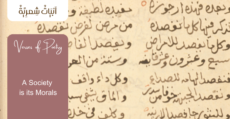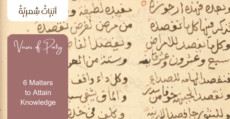In the name of Allāh, ar-Raḥmān (the most merciful), ar-Raḥīm (the bestower of mercy).
Below are a number of proverbs which either have an origin in Arabic, or are very similar to Arabic proverbs. In this humble compilation, I benefitted from Dr. Māzin ibn AbdurRaḥmān al-Beiruti who wrote an article regarding this subject.
He entitled his article:
أمثال عربية وأجنبية مشتركة
توحّد أفكار أم اقتباس من ثقافة الآخر؟
Common Arabic and Foreign Proverbs
Unity in Thoughts or Quoting from Other Civilizations?
In his introduction he mentioned: “These are proverbs which are common in both the Arabic language as well as other foreign languages…perhaps the commonality between them is due to similar situations and thoughts; some of the proverbs were adopted when the Muslims conquered European countries and the Europeans took the proverbs from Arab Islamic civilization, or perhaps the proverbs were adopted when the Europeans colonised Arab Islamic countries in the past century…”
***
Original Arabic: ضربت عصفورين بحجر
Literal Translation: I hit two sparrows with a single stone.
Popular English wording: Kill two birds with one stone.
***
Original Arabic: مِثل الذي يُفَتِّش عن إبرة بكومة قش
Literal Translation: Like a person who searches for a needle in a pile of straw.
Popular English wording: Looking for a needle in a haystack.
***
Original Arabic: الهدوء الذي يسبق العاصفة
Literal Translation: The calm that precedes the storm.
Popular English wording: The calm before the storm.
***
Original Arabic: القشة التي قصمت ظهر البعير
Literal Translation: The straw that broke the camel’s back.
Popular English wording: As above.
***
Original Arabic: ما يأتي بسهولة يذهب بسهولة
Literal Translation: What comes with ease, goes with ease.
Popular English wording: Easy come, easy go.
***
Original Arabic: عدو عدوي صديقي
Literal Translation: The enemy of my enemy is my friend.
Popular English wording: As above.
Comment: Although an Arabic proverb, it is not necessarily Islamic. In Islam alliances, frienships and animosities are based on truth and falsehood, and not mere personal benefits and interests. The principle of Al-Walaa wal Baraa is based upon the distinction between the truth and its people, and between falsehood and its people.
***
Original Arabic: الغاية تبرِّر الوسيلة
Literal Translation: The objective justifies the means.
Popular English wording: The end justifies the means.
Comment: Although mentioned in Arabic, this is not an Islamic proverb rather it opposes the Sharee’ah. It is possible that this proverb was initially taken from European revolutionaries and anarchists. Its intended meaning is that all means are permitted in order to fulfil an objective which is seen as being correct. Islamically, both the intended objective as well as the means to it must be good.
***
Original Arabic: كبش محرقة
Literal Translation: Sacrificial goat.
Popular English wording: Scapegoat.
***
Original Arabic: الرسل لا تقتل
Literal Translation: The messengers are not killed.
Popular English wording: Do not shoot the messenger.
Comment: The Arabic proverb has been taken from the Hadeeth of the Prophet sss (sal Allaahu alayhi wa sallam) with the same wording; Collected by Ahmad and Abu Dawood.
***
Original Arabic: وُلِدَ وفي فمه ملعقة ذهب
Literal Translation: He was born and in his mouth is a gold spoon
Popular English wording: Born with a silver spoon in his mouth
Comment: Referring to a person born in affluency, or a person who as never had to work to earn.
***
Original Arabic: الذي بيته من الزجاج لا يرجم الناس بالحجارة
Literal Translation: The person whose house is made from glass should not throw stones at people
Popular English wording: People who live in glass houses should not throw stones
Comments: Referring to a person who criticises other people for mistakes he himself also has.
***
Original Arabic: الطيور على أشكالها تقع
Literal Translation: Similar birds nest together
Popular English wording: Birds of a feather flock together
***
Original Arabic: إذا غاب القط لعب الفأر
Literal Translation: When the cat was absent, the mouse played
Popular English wording: When the cat is away, the mice will play







Thanks